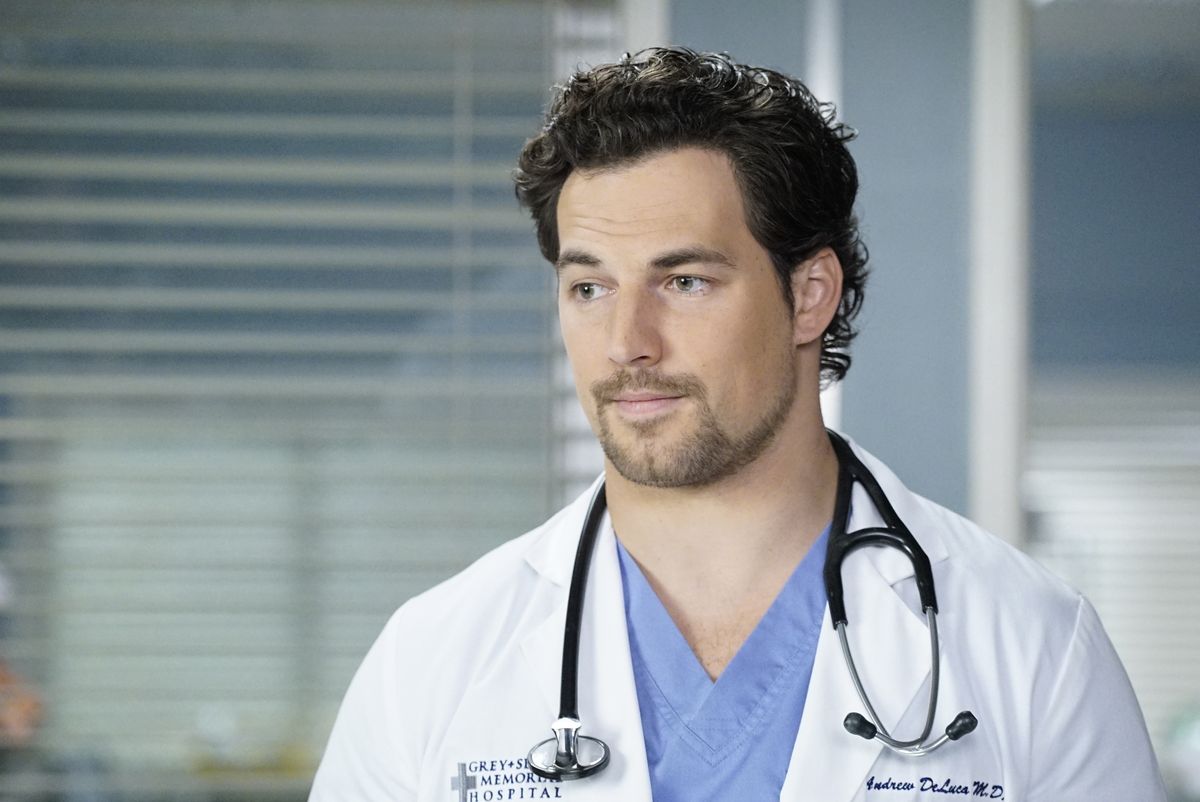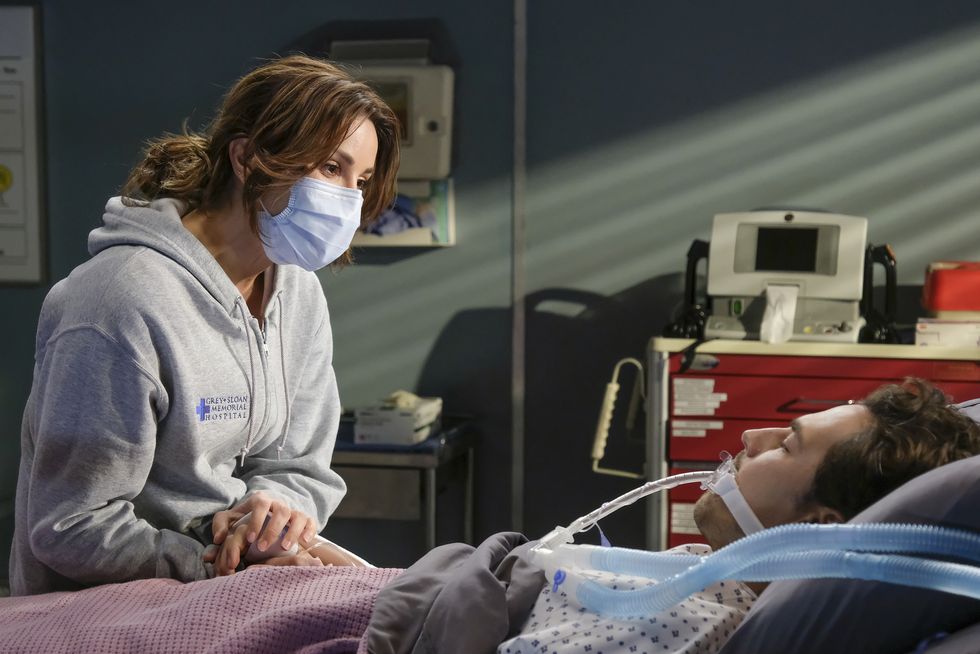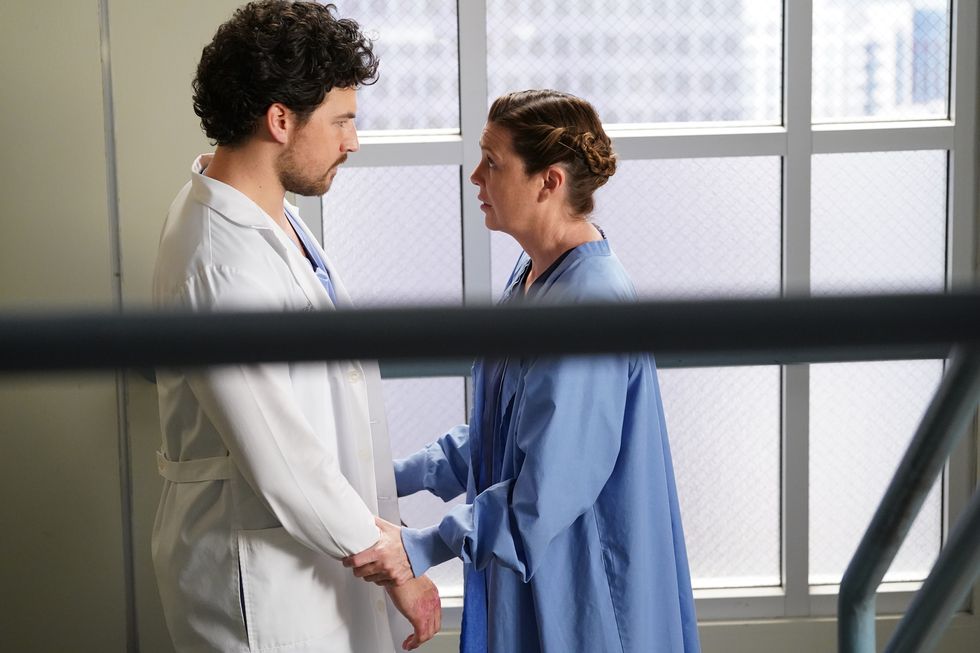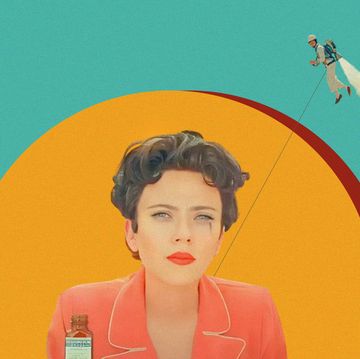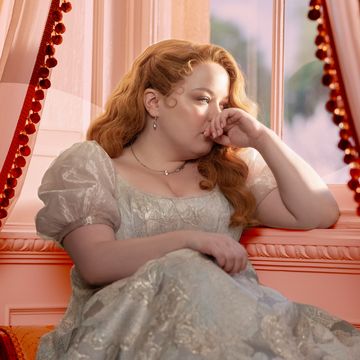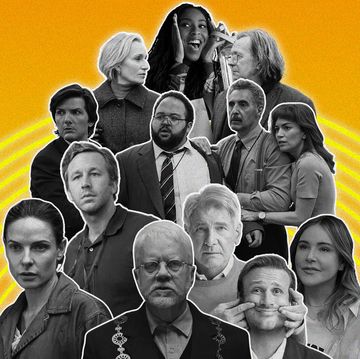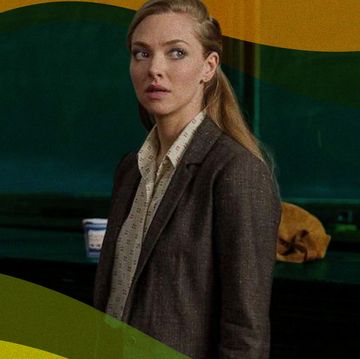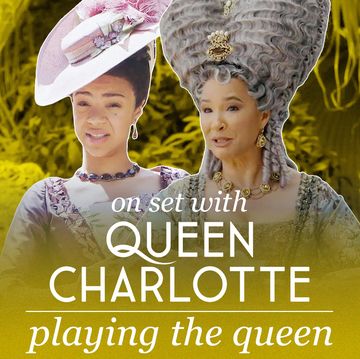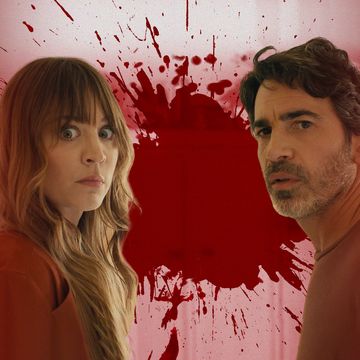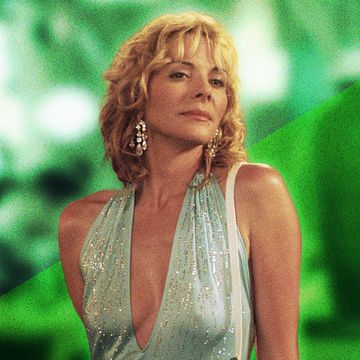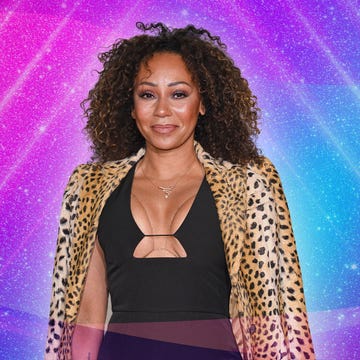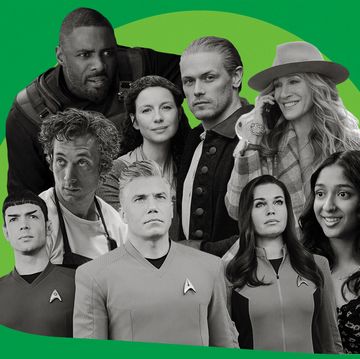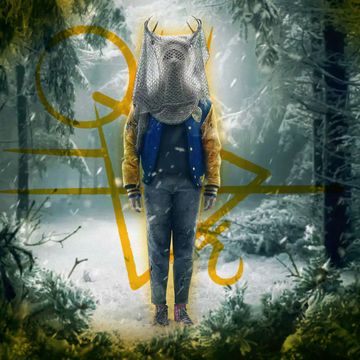When filming this week’s Grey’s Anatomy episode just barely a month ago, Giacomo Gianniotti, who has played Dr. Andrew DeLuca on the ABC series for the last seven seasons, lay on an operating bed for hours as DeLuca succumbed to a stab wound. “It was very meta,” says the Italian-American actor who has slow-burned his way into all our hearts, including that of Meredith Grey as her first serious lover after the tragic death of her husband, Derek Shepherd.
The beginning of the end for DeLuca began a year ago with the episode “Give a Little Bit,” when, during a manic episode, he tries to convince his colleagues that a patient of his is being trafficked by her “aunt” Opal, but he isn’t believed because of DeLuca’s battle with bipolar disorder. Fast forward to this season, the atrocity of human trafficking served as a bridge between crossover episodes of Grey’s Anatomy and Station 19, including this week’s episodes “Helplessly Hoping” and “Train in Vain,” respectively. In the crossover event, DeLuca pursues Opal after seeing her in the hospital parking lot in the previous episode. With the help of his sister, Carina, they trail her in a car and then to the train station because, this time, he’s determined not to let her slip out of his hands.
Carina coordinates via phone with her new live-in girlfriend, Station 19 captain Maya Bishop, as they work in tandem with the cops to capture Opal. And just as it’s all looking like a happy ending with Opal in custody, DeLuca is bumped by a mysterious man and a few scenes later, we find out he’s been stabbed by what was probably one of Opal’s henchmen.
DeLuca’s untimely death was a secret to everyone except Gianniotti and the show's writers and producers until the table read only a couple of months ago. And we spoke to the actor the day before his final episode aired to find out how it all came to a close.
Below, Gianniotti talks about how important the human trafficking storyline was — not just for DeLuca, but for the entire audience — and while this may be the end for Dr. Andrew DeLuca, it’s not goodbye for Gianniotti and the Grey’s Anatomy family.
VALENTINA VALENTINI: So, how did you find out that this was going to be the end for Dr. Andrew DeLuca?
GIACOMO GIANNIOTTI: I was called into an office with producers Krista Vernoff and Debbie Allen and they told me how they’d been going back and forth a lot on DeLuca’s story and kept coming to the same conclusion, the same ending, where DeLuca dies. We started talking about it and, of course, in the beginning, I was a bit taken aback. But once I realized how crucial the storyline was, how I could help a lot of people and shed light on the huge issue of human trafficking in America, I was on board.
VV: The human trafficking case has spanned two seasons and ultimately was the cause of DeLuca’s death. Was that always going to be the case?
GG: No. At the end of the last season, we saw how the girl was brought in, but nobody believed DeLuca. Because of Covid-19, our production was shut down and that ended up being our last episode, even though it wasn’t intended to be. When we picked the season back up in December after we were cleared for Covid-19 testing procedures, all this time and all this data suggested that that storyline was highly rated. A lot of people, through tweets and messages, were very eager about the human trafficking storyline, so the writers thought, okay, we have to deliver on that. Everybody seemed to be so concerned with the young girl and the trafficker and what happened to her and whether DeLuca would find her, but we didn’t know this going into that storyline, how everybody would react to it. When we brainstormed how that would all play out, we came to the quick conclusion that it would be an opportunity where DeLuca does save the day, does catch Opal and has her arrested which then stops the abuse of many young girls through this trafficking ring, but ultimately, he would have to give his life and die a hero, tragically.
VV: Who is to blame for DeLuca’s death?
GG: I mean, look, everyone who was in his life during those moments — his sister, Ben Warren, everybody at Station 19 — they were all telling DeLuca to stand down. They told him, “You are approaching an extremely dangerous person, wait for the police, wait for the professionals,” but that was what was told to him last time, and the system failed him, and he let this person slip out of his fingers. I think he was extremely motivated by his need to stop this person, which unfortunately left him to overlook a lot of red flags in a dangerous situation that he really shouldn’t have put himself into. I don’t think anyone is to blame.
VV: DeLuca really got to tie up some loose ends in his personal life, especially with his sister, and Meredith, even if it was in a dream.
GG: Meredith and DeLuca had an opportunity to salvage a romance and a relationship, but at that the beginning of this season, we see DeLuca being medicated, doing therapy, exercising, having a healthy diet, resting, and getting his bipolar on track so that he can live a healthy balanced lifestyle. He is in a position where he is much more able to deal with all the stresses in his life and balance a relationship, but unfortunately, because Meredith gets Covid-19 almost right off the bat, all of that went to the wayside and he just had to show up as a friend and physician to try and save her life. There wasn’t really the time to pick up the pieces of their relationship where they left off, but I think with the beach scenes, the dreams, we see some closure between them, which is a nice satisfying ending to their relationship regardless.
VV: Have you gained anything as an actor getting to be Ellen Pompeo’s number two for so long?
GG: Absolutely. From the beginning of the show, Ellen took care of me and took an interest in me. I think, originally, because of our Italian roots, she was very excited there was a new Italian guy on set, and we connected about our families; we shared a lot of interests, our taste in music. And then that bond became even better when the writers decided there would be a romance between them. We got to spend more time on set together and she is an incredible actress; she just knows how to turn it on whenever she wants. So to get to work closely with her and to witness that over the years, it’s been so amazing. She’s been a friend and a mentor and I’ve learned a ton from her. Even though I’m leaving the show, I know we will remain friends and in contact for many years to come. I’m grateful this show has given me Ellen, and all the other actors who I’ve become friends with, too.
VV: We don’t even see the stabbing, but, of course, we see the aftermath. Tell me what it was like filming that episode with everything that you knew going into it?
GG: It was hugely emotional. For a while, nobody else knew, so for a couple of episodes, I was holding this secret, knowing that the writers were developing this storyline. Then it came time for the table read and for everybody to know, and that was emotional. We’ve worked together for seven seasons now; these people are like family. We spend so much time with each other — we spend more time with each other than with our real families sometimes. Of course, everyone was sad to see me go, but they all agreed that the storyline was beautiful and that it was going to help a lot of people. And filming it, I kept remembering, “This is the last time I’m going to be in this room; this is last time I’m going to be in that room; this is the last time I’m going to share the screen with James Pickens, Jr., or with Kelly McCreary, etcetera, etcetera.” And being on that OR table was very strange and very real, laying there for hours, filming those scenes, knowing that I was on the table dying. It was very emotional, very meta. And while it was sad, it was beautiful too because it added more impact; all the producers and writers and cast, knew this was the exit of a major character and they gave it the importance that it deserved. Everybody needed the scenes to be handled with the utmost care and respect they put their A-game in. I’m really happy with the episode.
VV: Are there any cast rituals for when someone departs?
GG: With Covid-19, it eliminated those types of things, but they did all know that it wasn’t goodbye for good, though, because I still had to do some work on the show — I was going to come back to direct an episode of Grey’s Anatomy. So, even though I was saying goodbye as DeLuca, they knew I was going to be around for a while, so it was nice to have not such an abrupt goodbye.
VV: What’s it going to be like now that this run is over? What are you looking forward to doing next?
GG: I’ve been playing this guy for seven seasons, and although he’s been very dynamic and gotten a lot of great stories, especially in the more recent seasons, I’m so excited for what’s next. There are new opportunities to reinvent myself and surprise people with what I can do. I’m excited to enter the acting arena and have people see me in a new way. I’ll also keep establishing myself as a director, after the episode I directed of Grey’s Anatomy, I want to keep working as a director. I love it, I’ve always loved it. Being given this opportunity to direct an hour of primetime has been a huge honor and I hope to continue to work in both fields in Hollywood and elsewhere.
VV: Lastly, DeLuca struggled with mental health and came out the other side of that, as if he was flourishing. Why was that an important storyline for you to tell?
GG: Since its inception, Grey’s Anatomy has always been a champion for representation. In the beginning, it was about women — having women and women of color as leading ladies on shows and having all these badass female characters in leading positions, not just from an actor’s perspective of leading the show, but also what the characters actually do in their life. They were badass surgeons and heads of departments at the top of their game. Grey’s Anatomy has continued to blaze the trail in the way for representation, and so for me, my small role in that was through this mental health storyline about DeLuca being bipolar. He struggled for a very long time, all the way to a breakdown, to an intervention of his close friends and coworkers, to him actually accepting it and seeking help, which is a way of showing people that you don’t have to go through this alone, that you can ask for help, that it’s strong to ask for help, it’s not weak. And that if you do therapy and exercise and diet and rest, and maybe if your psychiatrist does suggest medication, you can live a balanced and healthy lifestyle. It doesn’t mean that you’re not going to have bad days. It doesn’t mean that you flip a switch and now everything is fine. No one would ever suggest that, but it suggests that life can be more manageable. And the representation, in this case, is seeing someone who struggled with that and is now an attending physician heading a whole surgery department in a hospital. That’s huge for representation. And I, gratefully, I got to be part of that story.
Valentina Valentini is a London-based entertainment, travel, and food writer and also a Senior Contributor for Shondaland. Elsewhere she has written for Vanity Fair, Vulture, Variety, Thrillist, Heated, and The Washington Post. Her personal essays can be read in the Los Angeles Times, Longreads, and her tangents and general complaints can be seen on Twitter at @ByValentinaV.
Get Shondaland directly in your inbox: SUBSCRIBE TODAY
